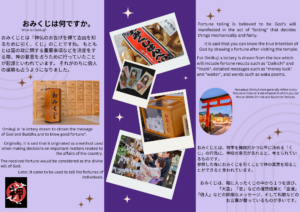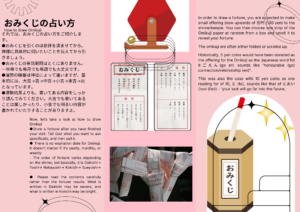学園祭歴史と私たちの経験 Gakensai History and Our Experience (ジェシカ)
学園祭は1921年にはじまる。長七伊藤は学園の創造性をしげきするために作品をさくせいした。第二次世界大戦後の学園祭はサクルー中心だ。学園祭では今色々なことが行われている。これはテーマカフェやお化け屋敷や屋台もある。
学園祭のためにみんなが色々なことをしてあった。私たちのグループは漢字を描けるようにクッキーを作れた。とても楽しかった。人々が私たちのストールを楽しんでくれたことを願っていった。
School festivals first began in 1921. Choshichi Ito (who was a Japanese academic) introduced school festivals in hopes of inspiring creativity among students. It was after World War Two (1946) that school festivals began to start looking like they do today. Stalls now include things such as themed cafes, haunted houses, and food stalls.
Everyone did lots of different kinds of stalls at our Gakuen-sai. Our group decided to make cookies and have people draw Kanji on them, inspired by omikuji fortunes you can purchase at Japanese shrines. We all had lots of fun at everyone’s stalls. Our favourite stall was the keyring one and we all bought a keyring. As a group, we plan to stay in touch when in Japan and take photos of us with our keyrings. We hope people had fun at our stall as well!


日本の学生運動 Japanese Student Movement (トゥルーヂィー)
さらに、学生運動があまりない。かほなさんによると、フェミニストサークルがあるが、他の政治のサークルがない。例えば、大学の労働党サークルがない。日本の大学は少し政治的なサークルがないので、大学で政治が見られない。そのために、多い学生は学生運動に参加していらない。また、大学生の政治の独立は大学による。例えば、上智大学では、学生は学園祭に運営をしている。しかし、上智大学には、カトリック大学ので、学生運動が好きじゃないため、政治的なところがない。
Next, there is not much student autonomy among students in Japanese universities. Students do not really take part in demonstrations or strikes, with political mobility being limited to very few societies according to Kahona-san. For example, there is not a “Labour Society” at their university. As there are almost no political societies at Japanese universities, political mobility is not easily accessible, or visible. For this reason, students often do not participate in student movements. Furthermore, the level of student autonomy depends on the university one researches. For example, students at Sophia University (上智大学) run and organise their own stalls at the Gakuensai (学園祭). However, as it is originally a Catholic school, the directing board is fairly opposed to student political demonstrations. Therefore, there is very little political aspect in this university. On the whole, students at Japanese universities do not take part in political movements or demonstrations due to personal choice and limited autonomy due to directing boards.
日本にいる留学生 International Students in Japan(ソフィー)
日本人の大学生とのインタビューで、筑波大学から来た留学生の一人は母校では多くの留学生がいるのに、彼らが日本人の学生と関わる機会があまりない。そのため、学生組合は留学生と関わる機会を増やしてほしいと言っていた。
日本は高齢化社会で、従業員が少なすぎるため、留学生が日本の大学に入学して、卒業した後、日本で働いてほしいと言っていた。卒業後に日本人ではない学生が日本に残って働くことを増やすには、大学は留学生を学業だけでなく学生生活もより支援しなければいけない。
In our interview with international students from Japan, one of the students said that, especially at the University of Tsukuba (their home university), even though there are many international students, there are very few opportunities for them to be involved and interact with the Japanese students, which they were regretful of and wished the student union did more to counter this, such as through Gakuensai.
In Japan, there has been a push to increase the numbers of international students, since there aren’t enough workers due to the aging population crisis and also pressures of an increasing global importance on the Japanese economy.
As many exchange students to Japan from Edinburgh university have expressed, the extra-curricular university life in Japan is not largely accessible to international students, given how intensive the commitment societies require. This may have a knock-on effect on the retention rate of students after graduation and so, if Japanese companies and the government want more students to remain, perhaps they should first better integrate international students into university life and culture.
学園祭と気候変動の関係 Environment and Japanese Universities(ステファニー)
私たちの時代に、気候変動の影響が明らかになるにつれて、いよいよ多くの人々が気候変動に対してますます興味がある。これは特に若者に見える。彼らは気候変動による影響の前に気候変動と戦えて結果を止まる。学園祭は、学生は環境危機に勝ける仕方イベントだ。いろんな人々が学園祭を体験するために日本の大学を行くので、気候変動について人に教える良い方法だ。調査によると、人は持続可能なものが欲しいのに、そのためにもっとお金を払うだろう。新聞とよるそのお金と、学生は学生生活も気候変動や助けるだろう。
In our times more and more people are showing increasing care about climate change as its affects are becoming clearer. This is especially true with young people as they are the ones that will be at the forefront of climate change’s consequences. Gakuensai is an event that can be used as a way to fight against these environmental crises. People of all ages visit Japanese Universities to experience Gakuensai which makes it a good way to spread awareness about environmental issues. Surveys show that people are so eager to use climate-friendly products that they pay more for them than non-climate friendly products and so students take advantage of this as a means to promote sustainable products and raise money for climate action in addition to other experiences crucial to enhancing student life through Gakuensai.


Leave a Reply